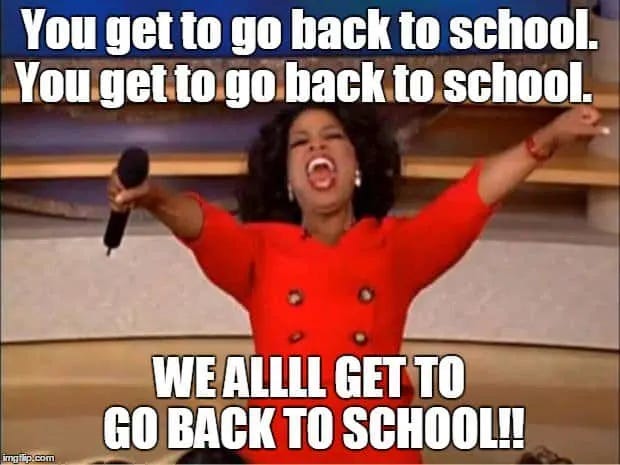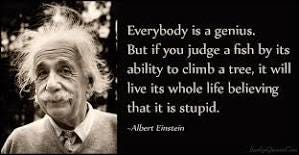Embracing Neurodiversity: Unveiling the Strengths of Unique Minds
Pernission to feel: Different
This time of year can feel like a new year, going back to school after the summer holidays.
Going into a new academic year can be exciting but it can also fill some with dread and worry, especially if you are neurodiverse, if you have been diagnosed with ADHD, dyslexia, dyspraxia or autism.
I wrote this poem because I was sick of the way neurodiverse kids have to go through a school system which doesn’t cater for the breadth of intellectual abilities. It’s called ‘Freethinking’ and I wrote it for two of my sons who have dyslexia.
My grandma called it word blindness, my mum ‘dyslexia’,But I know that they got it wrong - I’m just a free-thinker!Whilst neuro-norm go from A to B to get their answer quick,I’ve gone to Z and J and P - but this is quite a trick…We think outside the box you see,I see things differently.It’s not much use in a spelling test,But a gifted lot are we…Think actors like Keira Knightly, Aniston and Mr. Bloom.If only you’d see our talents - it’s certainly not all doom.Sportsmen like Lewis Hamilton and writers like good old Roald -Seeing us as thickies in the class is really rather old.Light bulbs were invented, Apple and Virgin tooAll thanks to our free-thinking; we’re really quite a crew.So don’t see me for what I can’t do, see me for what I can,‘Cos truth be told, we’re rather bold, in the betterment of man.I speak in the poem about dyslexia, because that it what I have most experience with.
This is in my book, by the way (l’il ol plug there).
A dyslexic mind needs to be taken in its entirety. Dyslexic brains often work at extremes. You may be excellent at spatial awareness for example, but struggle with visual reasoning. One school of thought on intellectual abilities is that intelligence can be assessed through:
Number aptitude
Verbal comprehension
Perceptual speed
Inductive reasoning
Deductive reasoning
Spatial visualisation
Memory.
I don’t actually know what half of those things mean.
However in the book Frames of Mind Howard Gardner recognised that the things that we often called ‘talents’ are actually a sign of intelligence, like:
Linguistic intelligence
Musical intelligence
Logical-mathematical intelligence
Spatial intelligence
Bodily-kinesthetic intelligence
The personal intelligences.
Dyslexics are overrepresented in innovative professional groups such as entrepreneurs, engineers, and designers. However, this may not be because their brains are ‘wired’ in a particularly different way, but because they are adept at looping back when they have made mistakes and have built the resilience to persevere.
Our educational system is geared towards the aforementioned intellectual capabilities. All children in school get graded in the same way which are related to effort, progress and aptitude. If you are assessing neuro-typical kids against neuro-diverse kids, neurodiverse kids are always going to fall short on aptitude.
What does this narrow thinking do to these children’s sense of self? At the typical age of diagnosis, around 7 years old, the brain is not developed enough to size up the fact that being dyslexic is ok even though they are in a system which continually measures them as if they were not dyslexic. So instead, this will be when shame sets in.
When we have an educational system that offers no choice to our children for them to be seen as capable and intelligent, we are setting them up for future difficulties. Shame is a sense of being wrong. When neuro-diverse children are in a system that makes them feel wrong for the way that they see the world and learn, we are helping them fill up their backpacks with shame that they will carry around for the rest of their lives.
In 2019 I went to iCAAD which is a conference on addiction and other ‘disorders’. I attended a lecture by Rowdy Yates called ‘Bad mouthing, Bad habits and bad bad boys’ (2012). He has done research to try and identify whether there is a relationship between dyslexia and drug dependence. In Rowdy’s research he tested 50 drug treatment clients for dyslexia and dependence severity. His results showed a prevalence for dyslexia of 40% in this population compared to the 4-5% in the general population.
Now, a sample of 50 is not statistically significant. The minimal sample size is 100 and this was a rough and ready exploration but I do think that there is something really important to note here. Addiction is a misunderstood term. Addiction is about medicating feelings that people do not want to feel. It’s about doing that compulsively even when it causes harm because it feels like there is no choice; a crystallised coping strategy, if you will.
I believe that that correlation is down to the shame that neuro-diverse children absorb due to the culture that they grow up in, and not having ways to call that out, challenge it or not take it on.
So remember, if you have a child who feels ashamed for not keeping up, or not understanding, they’re not wrong, they just don’t learn in the way that the school teaches. The fact that they can show up each day, get themselves together, remember where to go, remember the name of their teacher, are all achievements that they don’t mark in an aptitude test.
Maybe they are brilliant at music or parkour or putting flat packs together. Maybe they’re not, maybe they’re not particularly great at anything. That doesn’t mean they are any less worthy, because they are knock it out of the park fantastic at one thing, and that is at being them. There is only ever one them that will ever exist ever in the entirety of the universe. So how can we help them live today being brilliantly, astoundingly, unapologetically themselves? If we can help them live like that, that is worth a gold star.
As a bit of an addendum, we were in a fortunate enough position to be able to send our children to a mainstream school which specialises in dyslexia. When my eldest left, I wrote this reflection:
How do you judge a school? By its grades maybe, or its Ofsted report? Maybe its sporting record or the excellent musical recital or drama performance? These are certainly well used benchmarks.
What about how well the school protects the open heartedness of your child?
At the age of 6 my son was bullied at his school. With language processing issues, he struggled to say certain words and a girl gathered all the children together and got him to repeat certain words in front of them that she knew he could not say. This continued for a while, despite repeated meetings with the school and so we moved him. He stayed at the next school until he was 11, although he still experienced various struggles.
Despite his hard work and interventions outside of school to help with his learning he always scored very low in ‘aptitude’ as the aptitude tests were standardised towards age but not neurodiversity. As a child with dyslexia, he was compared to those without dyslexia. As Einstein famously said, ‘Everybody is a genius, but if you judge a fish by the ability to climb a tree, it will live its whole life believing that it is stupid.’ Even though he courageously talked about his dyslexia in a show and tell session at school he was still on the receiving end of being singled out and teased.
We were encouraged to enter him to a very sporty school for his secondary school. He is a gifted sports man; a fast runner and courageous rugby player. They were keen for him to hang his hopes on his sporting prowess. That bothered me, what if he got injured? He would, one day, need to read and make sense of a work contract or a mortgage document. I wanted to make sure that he would be prepared, not just on the sports field.
So we turned to Moon Hall in Reigate. When I mentioned my plans to the head of his current school I was told, ‘That is a remedial school, if he has Moon Hall on his CV employers will over look him.’ My reply: ‘If an employer overlooks my son because of his dyslexia then that is the wrong employer for my son.’ We enrolled him at the school.
My son has just finished his GCSEs at this school. He sat all of his GCSEs with confidence, having consistently worked hard at his revision. He stood up at the speech day as deputy head boy and delivered a speech clearly and confidently to a full auditorium that was in the 100s. And not just him, but also the head boy and girl and deputy head girl. All of them spoke with passion and tenderness about the school.
The children at the school look you in the eye, sure of who they are because they know that, yes, they have the label of dyslexia, but they are so much more than that. This school holds the tenderness of each pupil’s heart at the very centre of everything it does. There is no guardedness or bravado; no shame about their difficulties. I think that partly this is because they are all in the same boat, but it’s more than that. The leadership at this school is courageous; unafraid about the traditional ways by which a school may be judged because a job well done at this school is a child who can hold their head high for being who they are, for being all of who they are. And they succeed so brilliantly at this.
So for me, this school has succeeded, even before we know the outcome of his GCSE exams. I know that, thanks to this school, he will have the wholehearted resilience to deal with life and THAT, I think is the only way to judge a school.
Just an addendum on my addendum, my son is now very happily at the next stage of his education, doing subjects which bring a spring to his step and which he shows natural talent for.
We need accountants and lawyers and surgeons yes, but we also need story tellers - whether that is on the sports field or through photography or interior design or fashion.
Here’s another final poem
THE TORTOISE AND THE HARE
Don’t mess with the dyslexic kid,
‘cos I know I have to work hard to just scrape by.
And I will.
And I may even smash through your scores!
For I am the tortoise when you are the hare.
So rest on your laurels and your neuro norm thinking,
and one day, when you are least suspecting,
I may whip your butt
AND the score won’t matter to me,
‘cos I took my pride in surviving the struggle,
in knowing that my worth is not
wrapped up in the value of an exam score.
Imagine we lived in a world where we all accepted that each and every one of us had our human tricky thing. No talk of ‘specialist’ schools or ‘special needs’. Imagine we just addressed each person and took it for granted that they had a human tricky thing and then asked them what it was and went from there.
Happy New Year!
That’s it for now,
‘Til next time
Jacky x






Ohh I loved this, Jacky, thank you so much for sharing your and your son's story. I'm so happy that he is happy and confident. I left school feeling very stupid and like I would never be good at anything, and that's the case for so many! And it's something I'm so wary of with my two moving through primary school now - twins with such different abilities, interests and challenges.